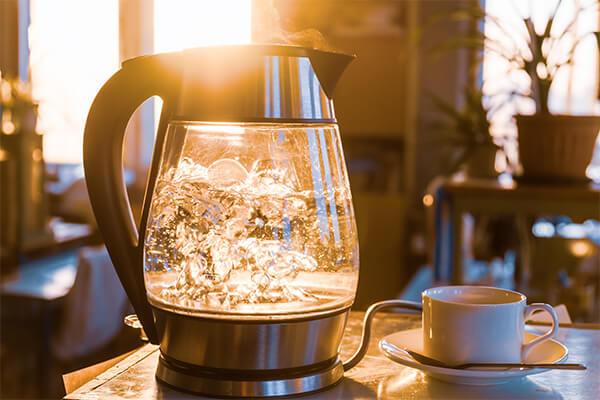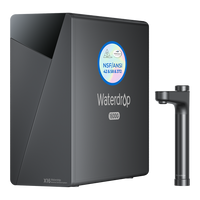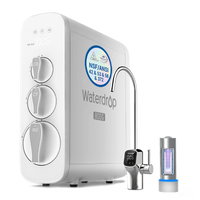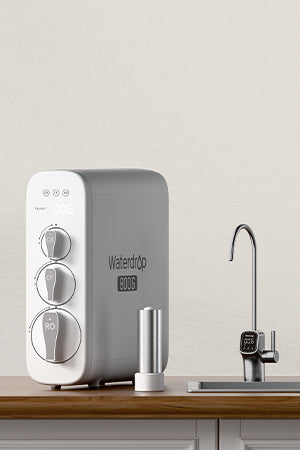We are all conceptually aware of the importance of clean water in the home, but why is it so important? Waterdrop has information right here.
On a conceptual level, everyone understands the importance of clean water. Water is one of the basic things that keeps us alive and keeps us healthy. It's as important to humans, animals, and plants as oxygen. Unfortunately, as public infrastructures have aged, and the quality of water and its delivery has eroded – sometimes literally – people have suffered. Without clean water, everything that consumes or uses that water takes on a level of risk that is unacceptable. We believe that everyone should have access to clean drinking water for a plethora of reasons.
Waterdrop is in the business of providing our customers with clean drinking water, and we're dedicated to helping everyone understand the importance of clean water in the home on a deeper level. Below we're going to lay out a handful of reasons that safe, clean water is essential in every household.
Preventing serious health risks and more
The most compelling argument with regards to the importance of clean water in home is statistical in nature. According to the United States Centers for Disease Control and Prevention, or the CDC, the
following data relate to people who do not have access to clean water on a worldwide basis:
- Approximately 780 million people, or more than twice the population of the United States, do not have access to what could be clean water sources.
- Approximately 2.5 billion people do not have access to proper sanitation.
- One of the most common results from lack of clean water is diarrhea. More than 800,000 children under the age of 5 die from diarrheal causes every year.
- Unsafe drinking water and lack of proper sanitation cause 88 percent of diarrheal deaths.
These are dire statistics, and it would be easy to dismiss this as a “someplace else” problem given that a large percentage of people suffering from a lack of clean drinking water live in developing countries. However, this is not a “someplace else” problem.
Mother Jones published a report in 2018 that stated that more than 19 million Americans get sick every year from drinking contaminated water. That's the equivalent of the combined populations of the following American cities:
- New York
- Los Angeles
- Chicago
- Houston
- Phoenix
Those are the five largest cities in the United States. This is both a worldwide and an American problem, and it's one that needs vast improvement for the overall state of public health.
It's not that the government hasn't tried to help protect and improve our water, as they are like everyone else in that they understand the importance of clean water in the home or anywhere else. In 1974, Congress passed the
Safe Drinking Water Act that established minimum standards in terms of quality for all water that could be used for drinking in the United States. While it's been helpful, the law unfortunately does not have jurisdiction over private wells or the bottled water market. Overall, we need to do better to prevent illness and even death due to contaminated water, as the data prove.
Providing proper nourishment
Everyone must consume water in order to stay alive, which makes it essential for obvious reasons. Every clean glass of drinking water contains a small amount of sodium, but it contains none of the following:
- Calories
- Fat
- Carbohydrates
- Sugars
While every source of water is somewhat different, most glasses of clean drinking water include the following minerals:
- Calcium
- Iron
- Potassium
- Magnesium
There is no set standard for the amount of water we are supposed to consume on a daily basis, but there are several different sets of recommendations that exist.
The Mayo Clinic published guidelines that state that men should consume approximately 15.5 cups of fluids on a daily basis, and women should consume approximately 11.5 cups.
As far as other nutritional benefits of clean drinking water are concerned, those benefits are far-reaching. A few examples of these benefits include:
- Removing waste from the body by way of sweat, urination and bowel movements
- Regulating your body's temperature
- Lubricating the body's joints
- Protecting sensitive tissues
- Preventing fatigue and moodiness
When we lack water, our body reacts instantly. It doesn't take very long to start to suffer from even mild forms of dehydration, and the effects of it are not only physical, but mental.
Avoiding dehydration
In general, unclean water does not taste very good, so people aren't as inclined to drink it unless there is no other choice. That means that people either choose some other liquid, such as sugary sodas or fruit drinks or they just don't drink much water at all. Each of these choices carries potentially significant health risks, the most problematic being dehydration. We mentioned it above, but
Hydration Info published an article that details what happens when someone doesn't have clean drinking water and therefore doesn't consume enough fluids. The following is not even an exhaustive list:
- Rising core temperature – Without water, your body's internal temperature begins to rise, particularly in hotter climates. Eventually, meaning within a few days, your body starts to almost cook from the inside out, and your organs begin to shut down. One of the more common problems related to this is heat stroke, which can be fatal.
- Heart disease – The circulatory system needs water, which basically acts as a lubricant, to properly function. When there isn't enough water present, blood pressure rises, and the heart has to work much harder to properly circulate blood throughout the body. This clearly elevates the risk of cardiovascular problems. Water thins the blood and makes this whole process easier on the heart.
- Kidney failure – The kidneys are charged with filtering out waste from the body. They need oxygenated blood in order to do so, and as discussed above, blood is oxygenated primarily with fluid intake. If a person does not drink enough water, then this filtering loses efficiency, organs suffer damage due to the presence of waste and the kidneys will eventually shut down.
- Hypovolemic shock – Hypovolemic shock may not be all that well known, but it is extremely dangerous and a direct result of dehydration. Once again, when there is not enough oxygen in the blood that's not getting enough fluids, blood pressure will drop to dangerously low levels. Eventually, cells begin to die and organs begin to shut down, and this can be fatal.
The consequences of not appreciating the importance of clean water in the home can be dire, and they can arise quickly, as in within a matter of days.
Cooking safely
In our homes, the water we cook with comes from the same source as our drinking water. Safe drinking water means more than just what we put in our glasses – it also deals with what we put on our stoves or in our ovens. Especially these days, with people cooking at home more than they have in the recent past, the importance of clean water is only heightened because of this approach to eating.
So what do we do with unclean water? Assuming we have access to a source of heat, we boil it, as that's what every health organization recommends when there is risk in any water supply. In fact, we see an enormous number of Boil Water Advisories in the United States. A study published by the Water Quality Research Foundation that analyzed these notices found that between 2012 and 2014, nearly 21,000 Boil Water Notices were issued across the country.
While boiling water does help eliminate bacteria and other living organisms that can damage a body, it does not necessarily mean that it results in safe drinking water. Boiling water for about a minute, which is the usual recommendation, does not remove lead and other contaminants that can still cause harm if consumed at unsafe levels. Therefore, even if you're boiling water as you prepare your food, that may not necessarily be enough to protect you from exposure to dangers.
Providing peace of mind
One needs to merely take a second to think of all the ways in which water is used in the home:
- Drinking
- Cooking
- Bathing
- Watering plants and gardens
- Hydrating pets
- Cleaning
If you fully understand the importance of clean water in home and you're unsure of whether or not you're getting it, this is something that could constantly be on your mind. Do you have thoughts run through your mind every time you hear a faucet running, a toilet flushing or a shower being turned on?
If so, you need to do something about it. Fortunately, obtaining clean drinking water is not all that difficult. Safe water is merely a matter of adding a product or two to your home and making use of them. Waterdrop provides a full line of products that are designed to provide clean drinking water that's nourishing, that tastes good and that's friendly to your budget. Simply take a look at our
products and find what may meet your needs. If you have specific questions about how you should proceed, please feel free to
contact us at any time. Our team of professionals, all of whom are dedicated to communicating the importance of clean water, is standing by ready to help you protect yourself and your family.









































































